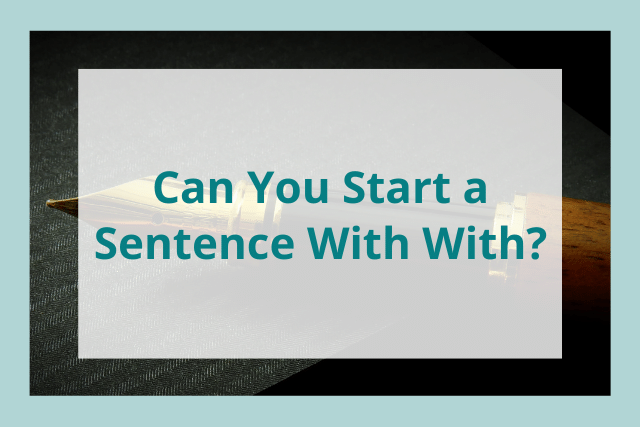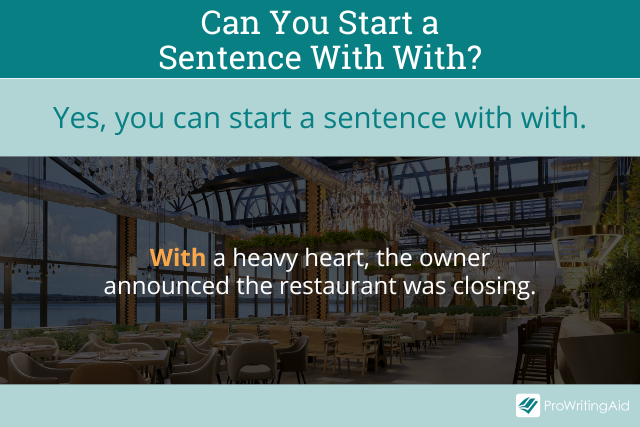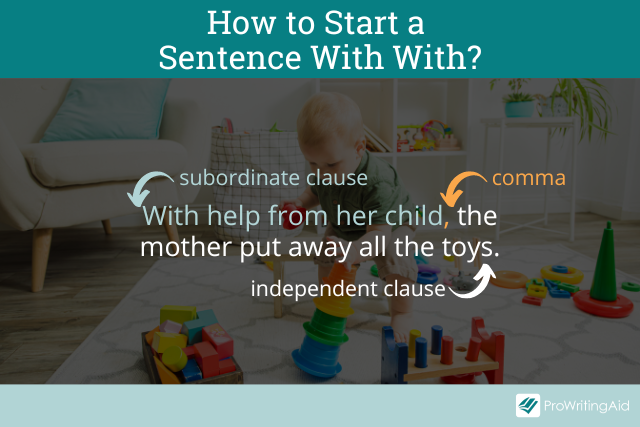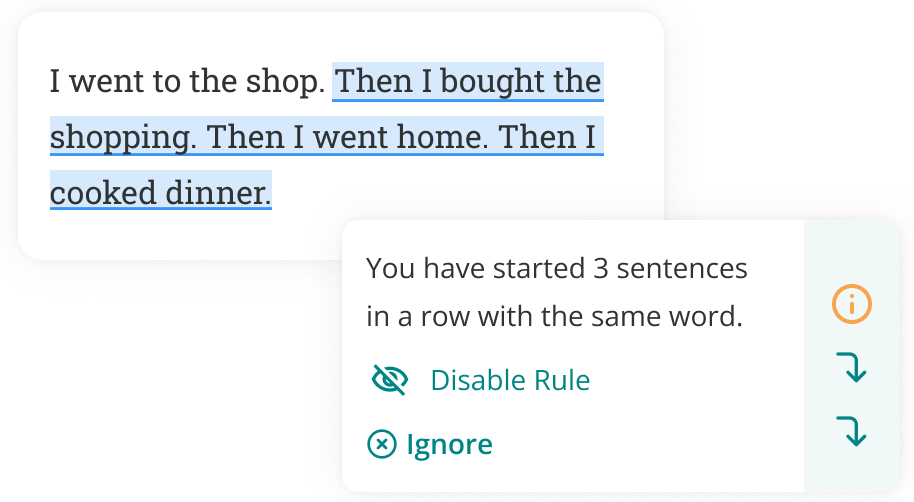
Grammar rules around prepositions like with are confusing. Can you start a sentence with with? The answer is yes, you can.
Whenever you aren’t sure about the structure of your sentences, you can run it through ProWritingAid’s free grammar checker. We’ll find all your grammar and syntax errors to keep your writing error-free.
Let’s take a closer look at how and when to start a sentence with with.
When Can You Start a Sentence With With?
You can begin a sentence with prepositions such as “with.” This rule applies to both formal writing and informal writing.
When a sentence starts with the word with, it’s usually a complex or compound-complex sentence.
A complex sentence combines an independent clause with at least one dependent clause. A compound-complex sentence combines one or more dependent clauses with two independent clauses.

A dependent clause, also known as a subordinate clause, does not express a complete thought and can’t stand on its own as a sentence. Certain words, such as with, are clues that you have a subordinate clause.
Take a look at this example sentence:
- With a heavy heart, the owner announced the restaurant was closing.
“With a heavy heart” is a subordinate clause. “The owner announced the restaurant was closing” is an independent clause. Together, these form a grammatically correct sentence that begins with with.
How to Punctuate a Sentence Starting With With
Because with at the beginning of a sentence is part of a dependent clause, there’s only one way to punctuate this type of sentence.
Whenever you start a sentence with a subordinate clause, you should place a comma after the subordinate clause and before the independent clause.
Use this formula for this type of sentence structure:
Subordinate clause + comma + independent clause
Then you’ll end the sentence with the appropriate ending mark, or in the case of compound-complex sentences, with another independent clause.
In short, always use a comma after a subordinate clause beginning with with at the start of a sentence.
Notice that this differs from ending a sentence with a subordinate clause. When independent clauses precede dependent clauses, no comma is necessary.

Examples of Starting a Sentence With With
Let’s check out some examples of sentences that begin with the word with.
- With only a backpack and a map, Jane set out on the greatest adventure of her life.
- With help from her child, the mother put away all the toys.
- With his wife’s approval, John booked a family vacation to Disney World.
- With a little elbow grease and some bleach, you can get the stain off the tile floor, and it will look brand new.
- With any luck, the rain will stay away until after our barbecue.
- With the new, larger wrench, I can change the oil in the car much quicker.
- With a library card, you can check out unlimited books and movies for free.
- With a smile on her face, she handed her rude boss her letter of resignation.
- With carrots, celery, and onion, you can make a mirepoix, which is a base for many French dishes.
- With only basic knowledge about computers, I often have to ask an expert for help when something happens to my laptop.
Alternatives to Starting Sentences With With
Many prepositions, such as with, can act as a subordinating conjunction and begin a subordinate clause. Let’s explore some other prepositions that you can start a sentence with.
The rule about putting a comma after the dependent clause still applies. If you open a sentence with one of these prepositions, be sure to put a comma before your independent clause.
Can You Start a Sentence With By?
By is a preposition that refers to how something is achieved. You can use by at the beginning of a sentence.
Here’s an example:
- By using ProWritingAid, you can improve your written communication skills.
Can You Start a Sentence With To?
To is one of the most commonly used prepositions in English. It has many definitions and uses. You can also use to to begin a sentence. Take a look at the sentence below.
- To get to the library, take a left on Main St. and a right on Second Ave.
Can You Start a Sentence With From?
From is a preposition that refers to a point of origin, whether in time or space. You can start a sentence with from, as in the example below.
- From the first time I saw you, I knew we could be great friends.
Can You Start a Sentence With Which?
Which can be both a preposition or, more commonly, a pronoun.
The preposition which doesn’t commonly begin sentences. As a preposition, which shows an effect of the preceding clause. This makes it difficult to place the dependent clause with which before an independent clause.
However, when which acts as a pronoun, it can begin a sentence.
Here’s an example:
- Which dress do you prefer: the red one or the green one?
Conclusion on Can You Start a Sentence With With?
Prepositions like with often function as subordinating conjunctions. When we place these at the beginning of a sentence and combine them with an independent clause, we can make a complex sentence.
There’s nothing wrong with starting a sentence with with. Just be sure to place a comma after the clause so that you are punctuating the sentence correctly.
But don’t start too many sentences in a row with with. Sentence variety is important for good writing. ProWritingAid’s Style Report will point out whenever you’ve started three or more sentences in a row with with.

You can also use the Structure Report to see how many of your sentences begin with a subordinating conjunction.


